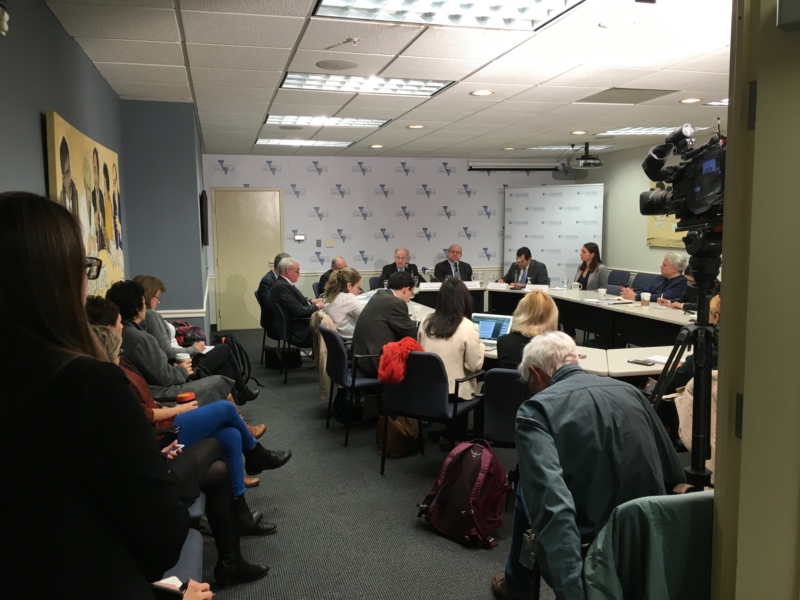President Obama’s Historic Trip to Cuba & Argentina
 Ben Raderstorf / Inter-American Dialogue
Ben Raderstorf / Inter-American Dialogue
President Obama’s visit to Cuba marked a historic moment: he was the first sitting US president to visit the island in almost a century. His trip also took him to Argentina, where he met with newly-elected president Mauricio Macri. To provide insight and analysis prior to this visit, the Inter-American Dialogue assembled a private press roundtable of leading analysts and journalists.
Michael Shifter, president of the Dialogue, opened the event with introductory remarks, followed by reflections from Jorge I. Domínguez, the Antonio Madero Professor for the Study of Mexico at Harvard University. From there, Dialogue experts Lisa Viscidi, Kevin Casas-Zamora, and Peter Hakim addressed a range of specific aspects of the president’s trip to Cuba and Argentina.
Jorge Dominguez on hemispheric context of @POTUS trip to a changing Latin America pic.twitter.com/YPZxeWcVaG
— The Dialogue (@The_Dialogue) March 17, 2016
Regarding Cuba, Domínguez identified four points around which the President’s visit should be contextualized. First, around a broader foreign policy agenda given that this visit will impact relations with other Latin-American countries as well as US domestic affairs. Second, around security cooperation: “the US has no better military ally than Cuba,” Domínguez commented, highlighting the collaboration between these two countries in Guantanamo, the coasts of Florida, and on matters of drug control. Third, with regard to domestic issues, including the First Amendment for the American people, protecting their right to travel, and also the right of Cubans to travel, meet journalists and access the internet. Fourth, in regards to human rights: “Cuba has been, is, and remains an authoritarian regime,” Domínguez clarified, and although there has been a positive trend, human rights violations are still a reality on the island. Michael Shifter added to these comments by noting how this trip’s announcement was received with little backlash in the US: “The administration experienced less confrontation than expected,” said Shifter. He also argued that although Obama does not expect the embargo to be lifted during his administration, he is confident that the next administration will be the one to do so. Kevin Casas-Zamora added that Obama’s trip clearly cements Obama’s decision to improve relations with Cuba regardless of what the island does. He also added that the US president has pursued this issue for the US’s sake, as a policy of isolation had become an embarrassment and an obstacle to relations with the rest of Latin-America. Peter Hakim added that Obama’s goal with the visit is to make progress on policy towards Cuba irreversible. Hakim also emphasized how the Castro brothers, and other leaders in Cuba, will be out of the picture soon, a transition that will set off a critical period in Cuban history.
According to @KevinCasasZ, Cuba could have the ability to push Venezuela towards reform pic.twitter.com/jRAV5Np0E3
— The Dialogue (@The_Dialogue) March 17, 2016
Responding to questions from journalists, Domínguez explained how the pressure that Cuba faces is now coming from voices inside the country, and not outside of it—changes that are being implemented respond more to the calls for greater productivity than the calls for a betterment of human rights conditions. Outside of Cuba, he believes that younger Cuban-Americans, those that were not exiles in the 1960s, are more likely to favor president Obama’s policy, as they would like to travel and communicate more easily with family and friends on the island.
With regards to Argentina, all the speakers agreed that this trip presents the chance to inaugurate a strong working relationship between the two countries and to build cooperation on a range of issues such as trade and energy, particularly focusing on economic engagement. Lisa Viscidi elaborated more on this last point, noting how in his short time in office Mauricio Macri has already promoted an agenda that strengthens trade and investment and emphasizes energy sector reform. As a result, there is already evidence of more investment from American companies. Additionally, just as the US under the Obama administration, Argentina has set ambitious goals to combat climate change. Viscidi noted that after the meeting between Macri and Obama we are likely to see more specific agreements around this topic. Finally, speakers addressed how President Obama will also attend an event while in Argentina to honor the victims of the dictatorship on the 40th anniversary of the military coup. Michael Shifter closed the meeting by stating how this visit, as a whole, signals a clear message from Obama: “The Cold War is over. Yes, the US made mistakes, but we are now in a different chapter.”
Also participating in this roundtable were correspondents from NPR, El País, The New York Times, Financial Times, The Guardian, The Associated Press, RCN TV, Tokyo Broadcasting System, and The Los Angeles Times.



















